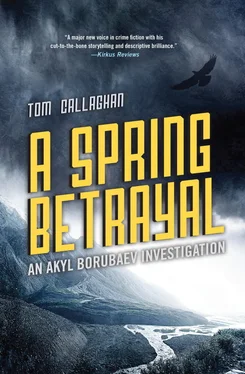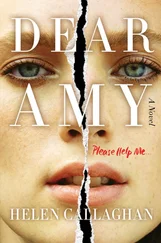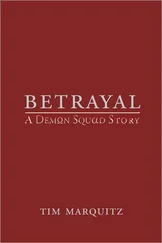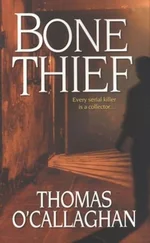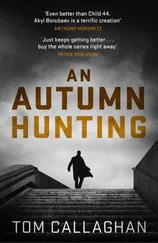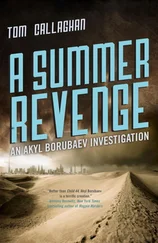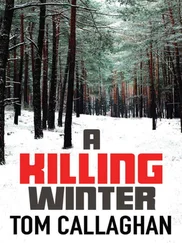“What would you like to drink, Otabek?” Saltanat prompted. “Moloko? You like pizza?”
The boy said nothing, but nodded, never letting go of Saltanat’s hand. Saltanat ordered milk, a Baltika Nine, the strong stuff, for herself, and pizza. I asked for coffee. When it came, it was lukewarm. We’re really much better at making chai .
Otabek sipped at his milk, eyes wary, saying nothing.
“Close call,” I said, stirring my coffee, the spoon rattling against the cup as my hands shook. Saltanat said nothing, rummaging through her bag for a pack of cigarettes. She lit up, snorted smoke through her nose, watching as it dissolved into nothing. Her eyes looked across the bar, but I sensed she saw nothing but muzzle flashes, heard nothing but gunfire that clattered like pebbles on a tin roof. And beyond that, a vision of the Voice, sprawled on the gravel, executed with a bullet in the back of his head.
“You’ll need to stitch me up again,” I said. “Sorry.”
Saltanat nodded, showing as little surprise as if I’d asked her directions to the bus station. I reached into my jacket to find my own cigarettes, but instead found myself holding the papers I’d liberated from the house.
They were crumpled and spotted in places with blood I sincerely hoped was mine, but still legible. I spread them out and started to read. I pushed the top page toward Saltanat, but she ignored it, continuing to stare out at her recent brush with mortality.
It looked like a bank statement, but in English, so all I could understand were the figures. Pretty impressive numbers, almost four million in some unstated currency. Great if it’s in dollars, even better in pounds, not to be sniffed at even in som .
“You wouldn’t know what this means, would you?” I asked Saltanat. She broke away from her reverie just long enough to scan the top page.
“It’s a bank statement, Akyl, even you must have seen one before,” she said.
“Never with so many zeroes in it,” I replied. “Do you know what currency it’s in?”
“Euros, most likely, since it’s from a Spanish bank,” she said. “What does it matter? It’s not like you have the ATM card to go with it.”
“No,” I said, annoyed by the sarcasm, “but there’s a clue right there, at the top of the page.”
Saltanat looked at it, then over at me, and smiled.
“You must be a detective.”
“It’s a name. It’s just a shame I can’t read it, with it not being in Cyrillic. English was never my strong point at school, so I never learned the letters.”
“Did your mother never tell you to study hard?”
I gave a bitter smile, and lit another cigarette, stirred the lumps in my coffee into submission.
“Not when she was away working in Siberia. And no one at the orphanage gave me much encouragement either.”
Saltanat gave me an appraising look, sensing the pain, the resentment I carry with me like a hunchback with his bent spine. I’d like to think I’m not bitter about some of the cards I’ve been handed out. But that doesn’t mean I don’t have the scars. Only one person ever gave me the support I’d wanted, needed, and she was dead and buried in a grave I’d helped dig. There’s no statute of limitations when it comes to mourning and missing someone you loved, and still love. And if there’s one thing I’ve discovered, it’s that sorrow never leaves you.
“I was a good girl, top of the class, I know my letters,” she said.
“And?”
“The name of the account holder?”
“Yes.”
Saltanat studied the letter again, taking her time, keen to make the most of my impatience.
“The very rich gentleman is called Graves. Mr. Morton Graves.”
I shrugged.
“Never heard of him,” I said.
Saltanat tapped the bank statement.
“I have,” she said, spacing her words for extra effect. “And he’s very rich. Very powerful. And very dangerous.”
I had no answer to that, and no idea what to do next.
I looked over at Otabek, who was concentrating on his pizza.
“So?” I said, once again unsure if Saltanat shared everything she knew, or if I was just a useful sidekick. “You know about this all-powerful pervert?”
“Let me tell you about Morton Graves,” Saltanat said, “and then you’ll have some idea what we’re up against.”
She screwed up the bank statement and placed it in the ashtray in front of us, using her lighter to set fire to one corner. I watched as the paper started to char, smolder, then burn, the flame eating the numbers, until black ash remained. Otabek stared at the flames, drank the rest of his milk, taking huge gulps. The pizza had vanished, so I guessed feeding him hadn’t been a priority for Morton Graves.
Saltanat ground the ashes into powder and looked across at me.
“We don’t want to be caught with any evidence of breaking and entering, do we? And it’s not as if having a bank account is illegal.”
“Even a rich man’s bank account?”
“Especially one of those,” Saltanat replied.
“So who is this man?”
Saltanat sipped at her beer, lit another cigarette, offered me her pack. For the ten thousandth time, I decided I was going to give up and shook my head.
“Morton Graves is an American citizen, although he hasn’t lived in the States for over twenty years. He’s been here in Bishkek for the last ten years, and his visa application describes him as a ‘businessman and entrepreneur.’”
“And you know this, how?” I asked.
Saltanat looked at me with the pitying glance she saved for my more foolish questions.
“Telepathy? Astrology? Educated guesses? If your ministry had any more leaks, you’d run out of buckets. And we like to keep a friendly eye on our neighbors.”
I nodded. Central Asia isn’t noted for principles before payments, and most upright citizens would dip their beaks if it meant a few som in their pockets.
“He has businesses here?”
“And Almaty, Tashkent, even Dushanbe; he’s a big player in the region. He’s a major investor in telecoms, cotton in Kazakhstan, a private bank in Uzbekistan, hotels, supermarkets, a couple of restaurants, precious metals, anything that wets his palm.”
“Drugs? Heroin, krokodil ?”
Saltanat shrugged, took another mouthful of Baltika, watching the bubbles simmer in the glass, tracing the condensation with a single scarlet-tipped finger.
“Rumors, but no one’s ever proved anything. And if he’s connected to the drug trade, then it would have to be with the consent of the Circle of Brothers. Payoffs, a quiet word in the right ear at the right time.”
After the collapse of the Soviet Union, a lot of the criminal gangs in the former “stans” grouped together in a loose collective called the Brothers’ Circle. Each of the countries has their own crime boss sitting at the table with their foreign counterparts, doling out territories, alliances, joint operations in information, not just in Central Asia but in Europe, Africa, Latin America, and the Middle East, the UAE in particular. Drugs are the big money-spinner, but they branch out into robbery, prostitution, counterfeiting, smuggling, anything else that can make money and isn’t legal. Devotion is absolute: break the rules and the only question is just how long it will take you to die, and how painfully. Even the Russian gangs admit to being lightweight in comparison.
The Circle’s possible involvement wasn’t the best news I’d ever heard, especially since I’d been involved in the assassination of Maksat Aydaraliev, the local crime boss in Bishkek. If Graves was linked to the Circle, he probably wasn’t a very nice man.
I looked over at Saltanat, felt the weight of the iPhone in my pocket, the weight of its contents heavy on my conscience.
Читать дальше
